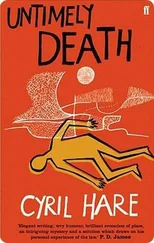It was one morning in the late autumn of 1969 that I caught the train from Brighton to Victoria Station in London, hopped on the tube to Oxford Circus, and duly presented myself at the reception desk at Broadcasting House as requested. I was excited and nervous. I sensed that a few very important hours lay ahead.
Somebody took me up the three floors to the offices of the radio sports news department, and there I was introduced to a slim dapper man with a thin moustache and slicked-back grey hair. I thought he was pretty old. He was about fifty-eight years of age. He greeted me with a firm handshake and a smile.
‘So you want to come and join the big boys,’ he said. His speech pattern and Scots accent seemed to produce a slight menace in the words as he said them. He was Angus McKay, a legend in BBC Radio. Shortly after the Second World War he had begun a programme called Sports Report , the five o’clock show that is still going today on Radio 5 Live and which is the longest running sports programme in the world. Its familiar signature tune, ‘Out of the Blue’, remains to this day as well. Angus had started with Raymond Glendenning, the most famous sports commentator of his day before television got into its stride, as his presenter, but soon found a young Irishman with a mid-Atlantic style of speech whom he would mould into a star. That young man was Eamonn Andrews, who of course went on to television fame with This is Your Life.
I noticed that Angus worked from an easy chair and in front of him was just a low coffee table. I learned later that he didn’t like desks. ‘If you have a desk, people put bits of paper on it,’ he would say. For Angus, everything was dealt with there and then.
He had heard one or two of my reports from Radio Brighton and apparently thought that my voice was OK and that if he put me through my paces I might make the grade. ‘First though,’ he said, ‘you’re a bit old to join the department [I was just twenty-seven]. We normally catch them younger. I want to make sure you know your sport, so we have worked out a little quiz for you.’
I was put in the hands of his number two, Vincent Duggelby, and asked to fill in the answers to a list of thirty-six sports questions. I got thirty-five right. I must have been a bit of an anorak. Anyway, things went pretty well and I was allowed to apply formally for one of the vacancies as a sports news assistant. The job might involve some broadcasting or production work or writing, or most likely all three. Some weeks went by before I was back at Broadcasting House for a voice test conducted by Bob Burrows, who in due course would take over as boss of the radio sports news department. I passed that test as well, and now came the appointments board. There were four people on the board, but I had figured out that Angus would be making the decisions and was the man to work to. I knew I had hit it off with him because I made him laugh, not the easiest of tasks. Bob Burrows told me later that Angus thought he might make something of me. He told Burrows he had found a new Sports Report presenter. Having been a military man, he had also liked the fact that I was neatly dressed and my shoes were polished. Angus was to change my life.
In a short space of time, I had gone from being an insurance inspector, to a freelance local radio broadcaster, to a member of the staff in national broadcasting at the BBC on a starting salary of £2,030 per annum.
I could not have been happier. Three other hopefuls were appointed with me: Chris Martin-Jenkins, the cricket writer and Test Match Special commentator; Bill Hamilton, who went on to be a television news man; and Dick Scales, who left broadcasting after a few years for jobs with Coca-Cola, Adidas and other businesses connected with sport. Dick and I hit it off straight away. He had a great sense of humour, an eye for the ladies, and was tough as you like – he had spent a few years in the military police before entering journalism. In fact, all of us new boys became good friends. Among those already in the department were Peter Jones, the then presenter of Sports Report and an outstanding football commentator; Bryon Butler, a man with a deep baritone voice and a clever wordsmith; and John Motson, who was younger than all of us.
After my first morning in the department I went off to lunch with Roger McDonald, one of my new colleagues, in the BBC canteen on the top floor at Broadcasting House. After lunch we got separated and I made my way down in the lift back to the office. I duly sat at the desk I thought I had left an hour or so before. After a while a chap came over to me and asked if he could help in any way.
‘No thanks,’ I said. ‘I’m just waiting to see how the afternoon sports desk is put together.’
‘Then perhaps you should go down one more floor,’ he said. ‘That’s where the sports department lives. At the moment you’re in documentary features.’
Wrong floor. Idiot.
After a couple of days I was asked to read the racing results live on air. Although I had done a good amount of far more difficult tasks in local radio, I was actually quite nervous imagining the enormity of the national audience at 6.45 in the evening.
Soon I was writing and presenting the fifteen-minute sports desk on some evenings, or else I was producing the programme, putting the recorded or live pieces together, briefing whoever was the presenter of the day, and getting the timing spot on so as not to trample all over the news at 7 o’clock. I was also occasionally producing the department’s half-hour weekly sports programme for the World Service called Sports Review. I found the voice work much easier than the production and gradually that part of my role fell into the hands of others who were more adept at it.
Just after I joined the department Angus told us that a new slot was to be our responsibility. The Today programme, the early morning current affairs show on Radio 4, was about to introduce a sports section that would go out live twice every morning – it is still part of the programme today. It would entail a reporter from Angus’ department coming in the night before to put the broadcasts together and then present them live the following morning. If you could grab a few hours sleep, a room was provided at the Langham Building, across the road from Broadcasting House.
Angus had selected me to do the very first one. ‘Vitally important you get it right, old son,’ he said. ‘Big audience. Don’t let me down.’
So on Grand National day 1970, the late Jack de Manio linked over to yours truly to look ahead to the nation’s big race.
After my second broadcast of that morning, Angus telephoned me.
‘An outstanding start,’ he said. ‘You have maintained the reputation of my department as top-notch.’ I thought my chest would burst with pride.
A few months later, after another early morning broadcast, Angus phoned me again. ‘I want you in my office in an hour,’ he said. ‘And you’d better have a very good reason for me not to sack you.’
I had transgressed simply by using in one of my pieces a journalist who was on Angus’ ‘black list’. Apparently he had warned me never to use this individual. I had either forgotten or not listened properly, and Angus was fuming with anger that this person should have made his way, at my invitation, on to one of ‘his’ programmes. After wiping the floor with me, he forgave this mortal sin of mine and I continued to be one of his boys. Angus put the fear of God into all of us who worked for him; but he disciplined us, taught us how to be proper broadcasters, and we had the utmost respect for him.
One of the problems with grabbing a few hours’ sleep in the Langham was that you had to remember to wake up. It was the job of the security man to call you at the appropriate time, but not all of them were reliable. One morning there was no call and I woke up at 7.15 – ten minutes before I was due to broadcast. I threw on a shirt and trousers, dashed across the road to Broadcasting House, grabbed my unfinished script from the sports room, and ran down the corridor to the Today studio.
Читать дальше












